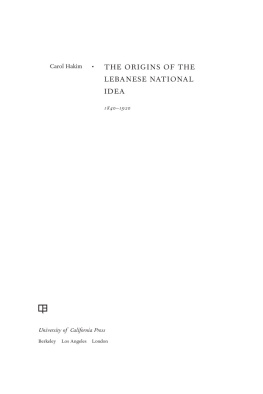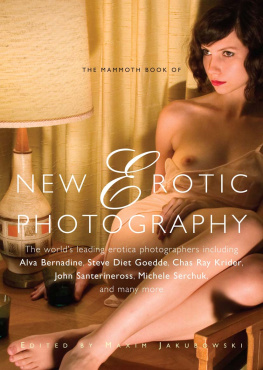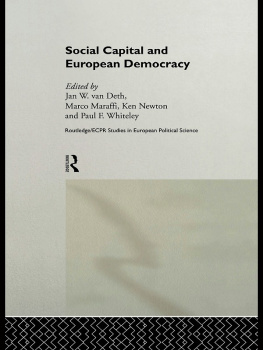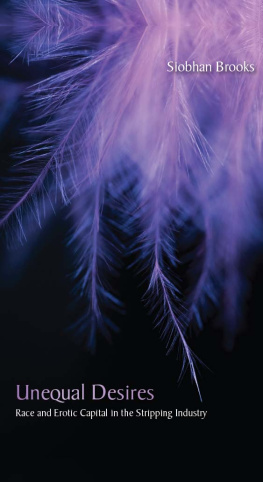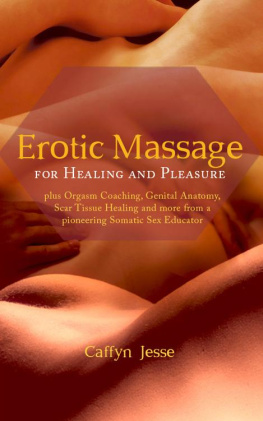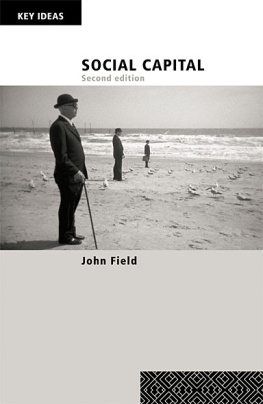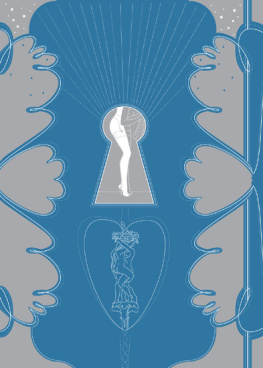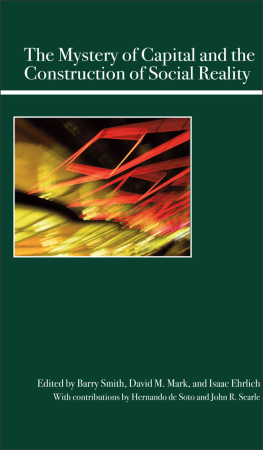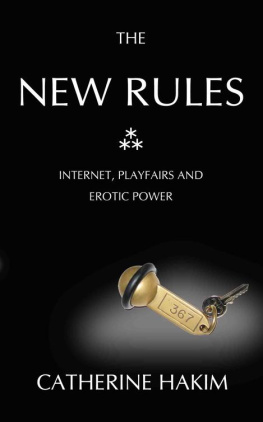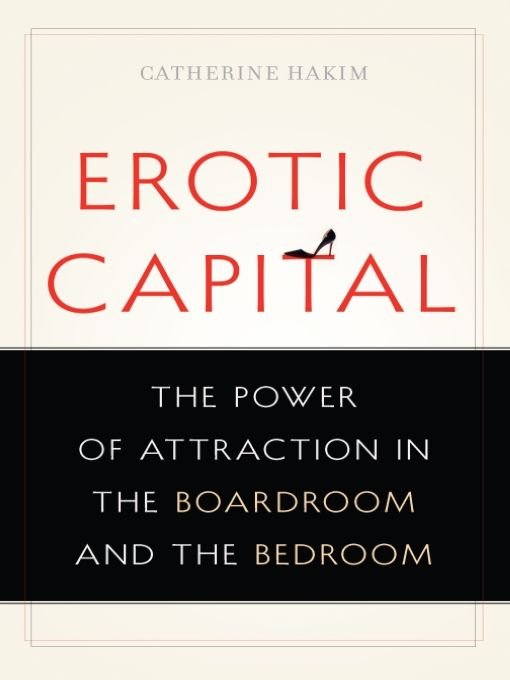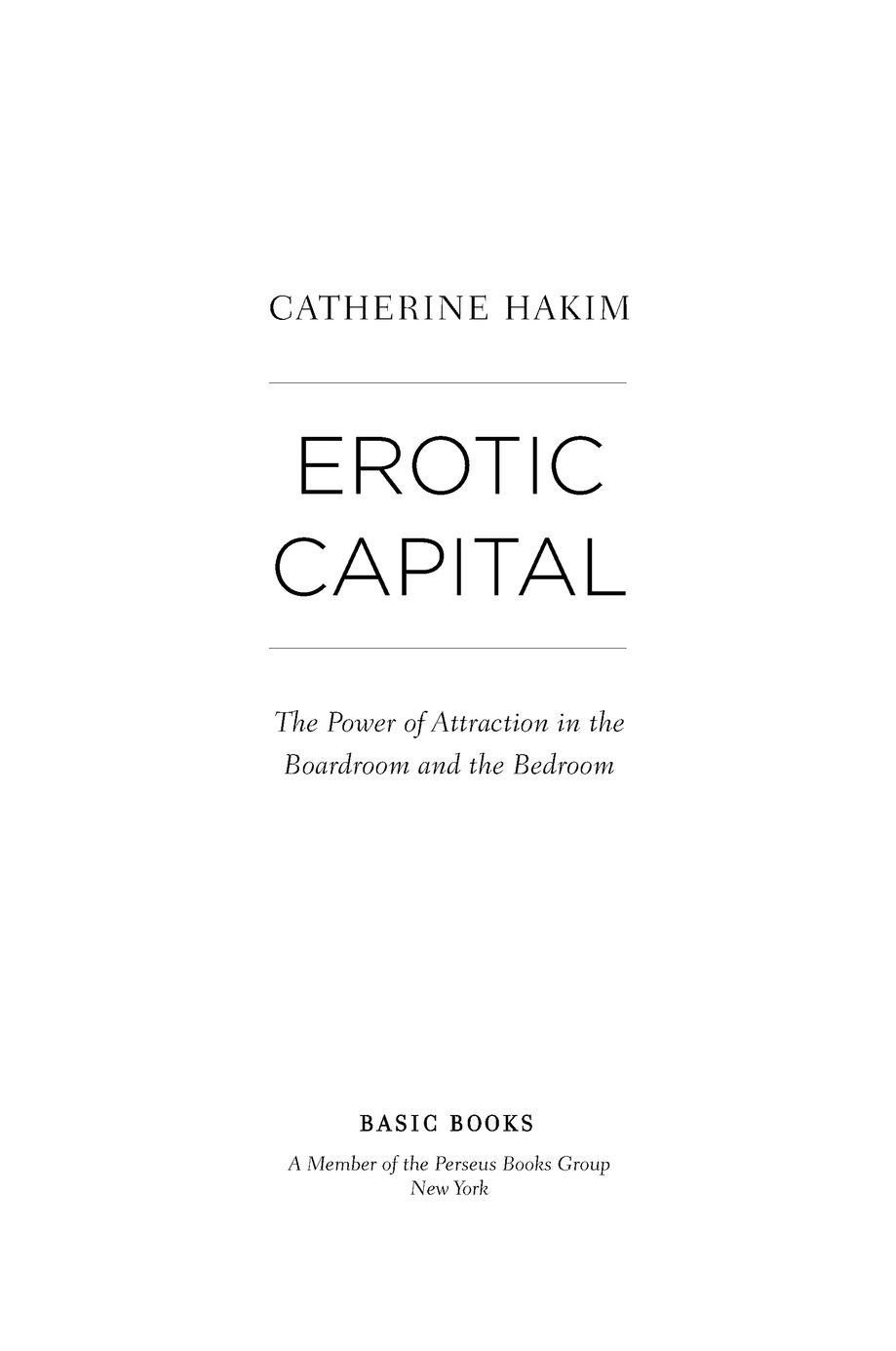Table of Contents
Table of Figures
List of Tables
INTRODUCTION
Erotic Capital and the Politics of Desire
Anna lost her well-paying job in financial services, so she had to work hard at finding a new one. She ate less, exercised, lost weight, and looked ten years younger. She went to the hair-dresser, got her hair cut shorter, colored, and restyled, and she looked even younger and more lively. She went shopping, invested in an expensive new suit that showed off her new trim figure and that made her look attractive as well as professionaland she wore it to all her job interviews. Anna felt confident wearing it. Three months later she had won a new job in consultancy paying fifty percent more than the old one.
Anna works in the private sector, where appearances count rather more than in the public sector. But when it comes to looking better, anyone can do the same. Why would anyone not invest in and deploy an asset that supplements intelligence, specialist knowledge, and experience ? People looking for a new job are often advised to rely on their social network, to exploit their social capital. But updating your appearance and style can be equally effective.
I coined the term erotic capital to refer to a complex but crucial combination of beauty, sex appeal, skills of self-presentation, and social skillsa combination of physical and social attractiveness that makes some men and women agreeable company and colleagues, attractive to all members of their society and especially to the opposite sex. We are used to valuing human capitalqualifications, training, and work experience. More recently, we have begun to recognize the importance of what is now called social capital and networkingwho you know instead of what you know. This book presents the evidence for, and impact of, a talent so completely ignored until now that there has never even been a label for it. Now there is: erotic capital.
Erotic capital is just as important as human and social capital for understanding social and economic processes, social interaction, and upward social mobility. It is essential for making sense of sexuality and sexual relationships. In sexualized individualized modern societies, erotic capital is becoming more important and more valorized, for men and women. But women have a longer tradition of developing and exploiting it, and studies regularly find that women have greater erotic appeal than men. Artists have known this for centuries.
Counselors who advise on job hunting remind us that you never get a second chance to make a good first impression. People who are short-listed for interviews are all suitably qualified and have appropriate work experience. Interviews display any extra talentssuch as erotic capitalthat help to make a winner. Anna already had the degrees and experience, so she invested in this other asset that is so often overlooked. For people who have few or no qualifications, erotic capital can be their most important personal asset.
Like intelligence, erotic capital has value in all areas of life, from the boardroom to the bedroom. Attractive people draw others to them, as friends, lovers, colleagues, customers, clients, fans, followers, voters, supporters, and sponsors. They are more successful in private life (with a greater choice of partners and friends) but also in politics, sport, the arts, and business life. In this book I want to explore the social processes that help attractive people to achieve more, faster. At what age does being attractive start to matter? Are the most beautiful and handsome people aware of their advantage? Is there any link between beauty and brains, so that a lucky few have a double advantage ? If you are not born beautiful, can you develop attractiveness anyway?
At an early stage, my study threw up a puzzle. Research shows that men benefit financially even more than women from high erotic capital ! As I expected, women score higher on levels of social and physical attractivenessprobably because they invest more effort in looking good and being agreeable. However men are rewarded more highly for their lesser efforts. In effect, womens erotic capital seems to be less well rewarded than mensmost demonstrably in the workforce.
Why is mens erotic capital more valorized than womens? Part of the explanation seems to lie in what I call the male sex deficitmens greater sexual desire, which leaves them frustrated from an early age. This deficit exerts a hidden influence on mens attitudes to women in private relationships especially, but also in public affairs. I discovered the male sex deficit by accident when trawling through the results of the recent sex surveys around the world. It is a popular truism that men never get enough sex. The male sex deficit interacts with erotic capital to color all relationships between men and women, at home and at work. Patriarchy has worked hard to conceal this in a fog of moralizing that controls womens public dress and behavior. As I see it, radical feminism has gone down a dead-end by adopting similar ideas that belittle womens allure. Why didnt feminists challenge male conventions about appropriate dress and proper behavior for women? Why not champion femininity rather than abolish it? Why does no one encourage women to exploit men whenever they can? Radical feminism can seem restricting rather than liberating. Even attractive feminists like Gloria Steinem, who once worked as a bunny in a Playboy club, have never championed womens erotic capital.
This is not a book presenting personal opinions and prejudices. All the arguments are based on and indeed developed from the extensive social science research evidence on these topics. My two central conceptserotic capital and the male sex deficitare new but evidence-based.
Erotic capital is gaining importance in affluent modern societies. Just as IQ levels have been rising steadily by about six percent per decade over the last century, levels of physical attractiveness are also rising slowly over time. The two processes are probably linked in some way, just as tallness is linked to cognitive ability and social skills. Can erotic capital be measured, just like IQ and height? Which is more important, physical attractiveness or social attractiveness?
It is well-known that being tall carries social and economic advantages, especially for men. Most U.S. presidents have been tall men, and almost always taller than their opponent in the other party. In the same way, it appears that social and physical attractiveness delivers a wide range of important benefits in the workforce and general social life as well as in private relationships.
The benefits of physical and social attractiveness for men and women in everyday life are measurablein friendship, dating, courtship, marriage, seducing lovers, having affairs, making friends, being regarded as good and honest, and generally having an easier time of it in most contexts. These lifetime benefits of erotic capital are sometimes called discrimination, but this is inappropriate. Scarcity confers value on any commodity, talent, or skill, be it the ability to be charming and persuasive, a knowledge of IT programs, the ability to fly a plane or run faster than others.
Erotic capital can be crucial within established couples, subtly altering day-to-day negotiations between partners over roles and responsibilities. Most research looks at heterosexual couples, but a similar pattern emerges among homosexual couples where one partner is younger and more sexually attractive. This results in the sexual economics of private relationships, or, as I put it, the sexonomics underlying all exchanges and relations between men and women.


